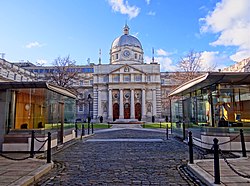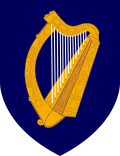History
Article 53 of the Constitution of the Irish Free State created the position of President of the Executive Council of the Irish Free State. The department was created by the Ministers and Secretaries Act 1924 as the Department of the President of the Executive Council, which came into operation on 2 June 1924. [3] Under that act it was assigned: [4]
the business, powers, authorities, duties and functions by the Constitution or by any existing or future Act of the Oireachtas or otherwise conferred on or to be discharged or performed by the Minister, who shall hold the office of and be styled Uachtarán na hArd-Chomhairle or (in English) the President of the Executive Council, and also the custody of and responsibility for all public archives and records and of papers and documents of State and of grants, deeds and other instruments of title relating to the property corporeal and incorporeal, real and personal for the time being vested in Saorstát Eireann and of records of the Executive Council and also the custody of the Seal of the Executive Council and also the responsibility for and control of the official publications of the Executive Council and also the administrative control of and responsibility for such public services and the business, powers, duties and functions thereof as may not for the time being be comprised in any of the Departments of State constituted by this Act.
The position of Taoiseach was created under Articles 13.1 and 28.5 of the Constitution of Ireland, which was approved on 1 July 1937. [5] Under the Constitution (Consequential Provisions) Act 1937, the Department of the President of the Executive Council was renamed as the Department of the Taoiseach from and after the coming into operation of the Constitution of Ireland, which occurred on 29 December 1937. [6]
This page is based on this
Wikipedia article Text is available under the
CC BY-SA 4.0 license; additional terms may apply.
Images, videos and audio are available under their respective licenses.




